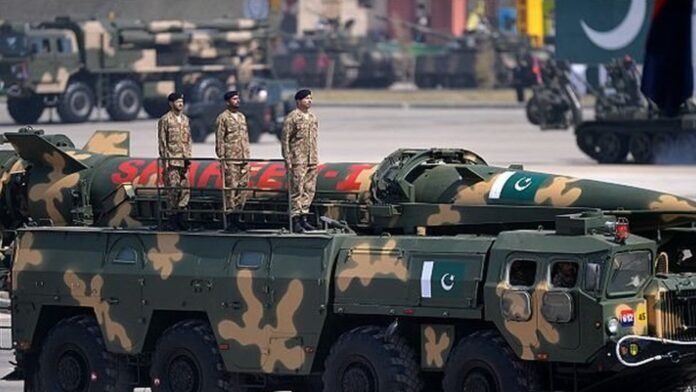Lieutenant General (R) Khalid Ahmed Kidwai, advisor to the National Command Authority, emphasized Pakistan’s position on not following a “No First Use” policy concerning Nuclear Strategy.
During his speech at a seminar held at the Center for International Strategic Studies (CISS) to mark Youm-e-Takbeer, Lt Gen Kidwai, who also remained Director General Strategic Plans Division (SPD), he was repeated that Pakistan does not have an NFU policy. He said that our nuclear weapon state does not bind itself against using them first in any case.
NFU refers to a country’s stance and assurance that its nuclear weapons are not intended for initiating a nuclear war. Traditionally, Islamabad has maintained ambiguity about the NFU policy due to New Delhi’s declared stance, despite Pakistani strategists always being skeptical and viewing India’s policy as more rhetoric than reality.
Doubts about Indian intentions arise from ambiguities in India’s NFU doctrine, which includes conditions allowing nuclear strikes against states or their allies equipped with nuclear weapons under certain threats. Such exceptions undermine the fundamental principle of NFU and imply a willingness to use nuclear weapons first in specific scenarios.
Recently, India has shown a significant shift from its traditional NFU stance to a more aggressive Nuclear Strategy posture. Internal debates in India about revising its NFU policy have prompted Pakistan’s military leadership to take countermeasures.
General Kidwai asserted that Indian leadership should have no doubts that Pakistan’s operationally ready nuclear capability empowers every Pakistani leader to face India with freedom, dignity, and courage.
Modi Criticizes Opposition on Pakistan’s Nuclear Program
His statement came against the backdrop of contentious discussions about Pakistan’s nuclear program during the Indian elections. Where Indian Prime Minister Narendra Modi used the topic to criticize the opposition Indian bloc and its leaders. Portraying them as fearful of Pakistan’s nuclear capabilities.
Modi also commented that he appraised Pakistan’s capacities while visiting Lahore in December 2015 as a rejoinder to Congress leader Mani Shankar Aiyar’s statement that India should respect Pakistan’s nuclear capabilities.
At the seminar, General Kidwai discussed Pakistan’s nuclear program and suggested that emerging technologies be used for this purpose. He said technological advances will continue to blend appropriately with national security in Pakistan and strengthen its nuclear program further.
According to him Full Spectrum Deterrence (FSD) capability of Pakistan includes all types of nuclear weapons within the concept of Credible Minimum Deterrence (CMD).
He said the Army Strategic Force Command (ASFC) deploys nuclear weapons on land, the Naval Strategic Force Command (NSFC) deploys at sea, and the Air Force Strategic Force Command (AFSC) deploys in the air.
In addition, General Kidwai said that India’s Dynamic Response Strategy (DRS) represents. An understanding of how much Pakistan can achieve with its powerful nuclear arsenal. Pakistan’s strategic weapons are seen as peace devices because they have limited range and destructive power compared to other types. Like tactical ones.
Retired Brigadier Zahir Kazmi, Director General of the Arms Control and Disarmament Affairs (ACDA) branch of the SPD. Highlighted the emerging threats and enduring challenges to Pakistan’s nuclear program. Emerging threats included new technologies. The geopolitical environment, and hybrid warfare while enduring threats comprised India’s aggressive posture, sanctions on Pakistan, and information warfare.


